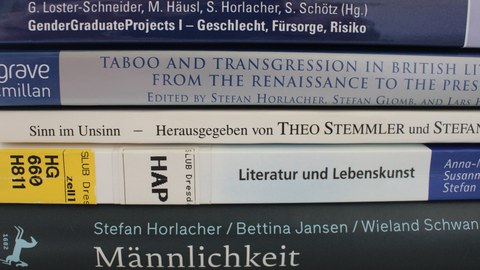Our Research
In research and teaching, English Literary Studies deal with English literature and texts (in the broadest sense) of Great Britain and Ireland. Another focus is on New English Literatures / Postcolonial Literatures in English. The central philological questions of traditional literary studies are closely intertwined with the perspectives of culture, linguistics, media theory, and gender studies.
Research Profile of the Chair of English Literary Studies
An integral part of English Studies are New English Literatures and their very own, decidedly 'other' tradition of Anglophone literature, which also shed a different light on British literature. This includes the postcolonialist debate, as well as questions concerning alterity, stereotypes/projections, hybridity, and cultural negotiation. Thus, it becomes clear that the Chair of English Literary Studies at TU Dresden does not restrict its teaching to a fixed textual canon, but also addresses the interaction and reciprocal changes of society, culture, and writing. Our close cooperation with Cultural Studies as well as Linguistics also becomes manifest in different research projects of the faculty and the School of Humanities and Social Sciences which the Chair of English Literature is actively involved in.
At a Technical University, in particular, there is a certain responsibility for English Literary Studies to include "technical" aspects: The discipline of literary studies has linguistic roots, as it deals with language, and the notion of writing subsequently opens up the field of comparing different "writing systems", as well as phono- and logocentrism. Moreover, the materiality of communication and the media as well as the influence of different media on human behaviour are highlighted. This necessitates several pertinent questions: How do new media influence human perception and our ideas of the world? How are they handled on the content level of literature? To what extent does literature itself change due to a changing media environment and technological opportunities and constraints? How doesliterature work as cultural memory, as a storage medium of knowledge, experiences and memories, and how does it function as an analytic instrument? Can we even talk of a savoir littéraire inherent to literature? Our courses seek to mediate a fundamental understanding of these new technologies; on the other hand, however, our work on the the interaction of literature and other media enable us to pursue the specific realities produced by new media.





